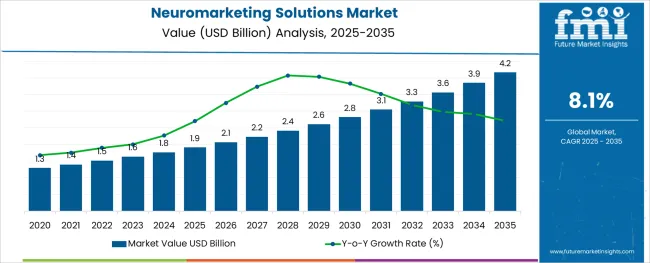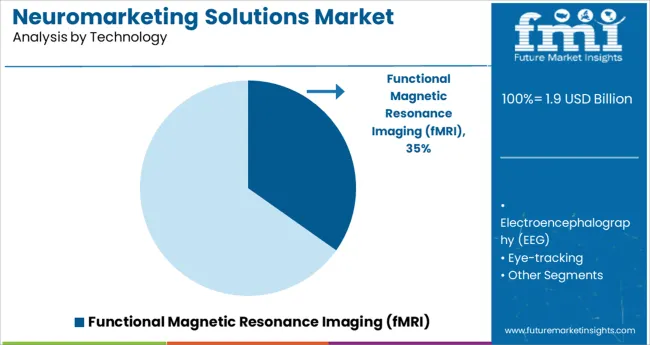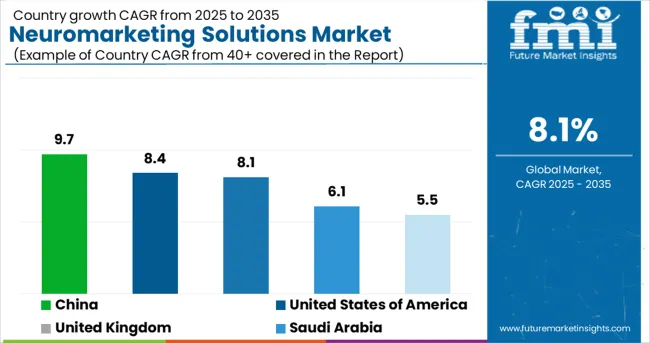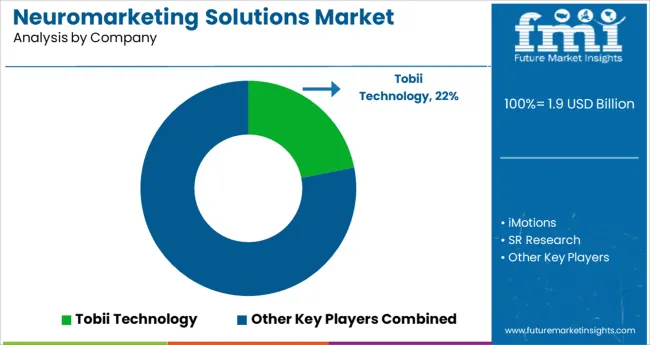The Neuromarketing Solutions Market is estimated to be valued at USD 1.9 billion in 2025 and is projected to reach USD 4.2 billion by 2035, registering a compound annual growth rate (CAGR) of 8.1% over the forecast period.

The neuromarketing solutions market has been experiencing steady traction as consumer behavior analysis becomes increasingly critical in refining marketing strategies and product positioning. With businesses prioritizing data-driven insights to predict customer preferences and optimize advertising effectiveness, demand for neuroscience-based research tools has expanded significantly.
Technological advancements in brain imaging, eye tracking, and biometric monitoring have improved the accuracy and affordability of neuromarketing solutions, allowing a broader range of industries such as retail, media, FMCG, and healthcare to adopt these techniques. The future outlook remains positive, supported by a rising emphasis on emotional engagement metrics and non-conscious consumer response evaluation.
As digital platforms grow increasingly crowded and competitive, companies are expected to invest in tools that deliver nuanced insights into audience behavior and subconscious decision-making patterns. Moreover, collaborations between commercial enterprises and academic research institutions are fostering innovation in cognitive response measurement. The market’s ability to enhance marketing ROI, predict purchasing intent, and reduce campaign risk positions neuromarketing solutions for sustained adoption across developed and emerging economies alike.
The market is segmented by Technology and region. By Technology, the market is divided into Functional Magnetic Resonance Imaging (fMRI), Electroencephalography (EEG), Eye-tracking, Positron Emission Tomography (PET), and Magnetoencephalography (MEG). Regionally, the market is classified into North America, Latin America, Western Europe, Eastern Europe, Balkan & Baltic Countries, Russia & Belarus, Central Asia, East Asia, South Asia & Pacific, and the Middle East & Africa.

The functional magnetic resonance imaging (fMRI) segment accounted for approximately 34.8% of the neuromarketing solutions market, establishing itself as the most utilized technology within the industry. This segment’s dominance has been driven by its proven ability to deliver high-resolution, real-time mapping of brain activity in response to marketing stimuli, providing marketers with precise insights into emotional triggers and decision-making processes.
Although traditionally associated with academic and clinical settings, fMRI has increasingly been incorporated into commercial neuromarketing projects due to improvements in imaging software, reduced operational costs, and growing recognition of its analytical value. The capacity of fMRI to measure deep-brain responses linked to memory, reward, and emotion has rendered it invaluable for assessing the true effectiveness of advertisements, product packaging, and branding initiatives.
Moreover, its application in validating consumer reactions to new product concepts and pricing models has been widely endorsed by leading consumer brands and advertising agencies. While other technologies such as EEG and eye tracking offer lower-cost alternatives, the unparalleled spatial accuracy and comprehensive data output of fMRI systems are expected to maintain their relevance within high-budget neuromarketing campaigns and strategic market research endeavors in the foreseeable future.
The neuromarketing solutions market analysis indicates that during the projected period, the global neuromarketing solutions market is expected to develop due to an increasing requirement to monitor consumers' purchasing behavior.
As per the new market research report on neuromarketing solutions, the market has progressed into a useful tool for studying and analyzing customer purchasing behavior and making better marketing selections. Marketers use neuromarketing to understand better the aspects that influence consumers' purchasing decisions. Understanding this behavior is critical for product design, product advertising, product branding, and product advertising decisions.
As a result, the increased need for understanding and studying customer buying behavior in order to make effective and efficient marketing decisions is likely to drive neuromarketing solutions market growth throughout the forecast period.
Over the forecast period, the worldwide neuromarketing solutions market is expected to develop due to the adoption of cutting-edge technologies to understand customer purchasing behavior. To understand and analyze a person's behavior toward visual and audio stimuli, major neuromarketing solutions providers in the market are focusing on adopting cutting-edge technologies such as biometrics that measure heart rate, eye tracking & facial coding, functional magnetic resonance imaging (fMRI), and galvanic skin response (GSR).
Better and more effective marketing tactics have been developed to successfully advocate a product or service. Over the forecast period, these factors are expected to boost the global neuromarketing solutions market adoption trends.
Over the projected period, the high cost of neuromarketing is expected to limit the growth of the global neuromarketing solutions market. Scanners like fMRI and MEG equipment have a significant initial investment and ongoing operating costs. Because these systems are so huge, they take up a lot of room and restrict workspace mobility.
The cost, mobility, and scalability of bulky neuromarketing technologies like fMRI and MEG scanners are important roadblocks to their widespread use. As a result, over the forecast period, high costs and mobility concerns are projected to limit the demand for neuromarketing solutions.
Eye-tracking systems are becoming increasingly popular in the neuromarketing solutions market and advertising research, which could lead to profitable growth prospects. In gaming and virtual reality, eye-tracking systems are used.
These methods are increasingly being utilized in market research to monitor and track shopper eye movements in stores. In the sphere of website design, the eye-tracking solutions market has a lot of room for growth. Furthermore, the area is predicted to see significant expansion in the fields of market research and advertising research, as well as the ability to perform online research.
Significant business opportunities are projected to arise as research and development activity increase in the neuromarketing solutions market. Because neuromarketing solutions are too expensive for small and medium-sized businesses, it is critical to supply cost-effective alternatives.
Many solution providers are concentrating their efforts on research and development in order to create scalable and cost-effective solutions. Market participants might concentrate on Research and Development operations and grow their global footprint and fully utilize the available neuromarketing solutions market key trends & opportunities.
Functional magnetic resonance imaging (fMRI), magnetoencephalography (MEG), eye tracking, electroencephalography (EEG), and positron emission tomography (PET) are the many types of technology used in the global market for neuromarketing solutions.
With a neuromarketing solutions market share of 47.6%, the fMRI section led the way, closely followed by the EEG segment. Although end users are concerned about the mobility and expense of fMRI equipment, demand for this technology is not likely to be hampered in the coming years, assuring the segment's continuous dominance.
EEG is the second most popular neuromarketing technique, and it is projected to remain so in the next years. In the near future, eye tracking is predicted to pique the interest of experts working in the field of advertising research.
The majority of eye-tracking technologies are used in advertising and media studies. Because companies that provide eye-tracking solutions are likely to be actively involved in the process of developing improved remote as well as mobile eye-tracking solutions, the neuromarketing solutions market size is expected to grow at a rapid rate in the coming years.
Functional Magnetic Resonance Imaging (fMRI), one of the neuromarketing solutions sectors, is expected to grow at an annual rate of 8.2% and reach USD 1 billion by the end of the forecast year.
After an early assessment of the pandemic's commercial ramifications and the resulting economic crisis, the electroencephalography (EEG) segment's growth is corrected to a revised 9.3% CAGR over the next seven years.

In the year 2035, the neuromarketing solutions market in the USA is expected to be worth USD 4.2 Million. China, the world's second-largest economy, is expected to reach a market size of USD 305.9 Million by 2035, representing a 9.7% CAGR throughout the analyzed period. Japan and Canada are two more important geographic markets, with forecasted growth rates of 8.1 percent and 7.2 percent, respectively, from 2024 to 2035. Germany is expected to expand at a CAGR of around 7.2 percent in Europe.
The demand for neuromarketing solutions is rising steadily on a global level.
| Regions | CAGR (2025 to 2035) |
|---|---|
| United States of America | 8.4% |
| United Kingdom | 8.1% |
| China | 9.7% |
| Saudi Arabia | 6.1% |
| Brazil | 5.5% |

There are multiple companies in the neuromarketing sector, which is moderately competitive. With the rising need for neuromarketing applications and technical improvement throughout emerging economies, few firms are now leading in terms of market share; numerous companies are strengthening their market presence, consequently expanding their company footprint across new markets.
Product launches are a priority for market leaders in order to expand the demand for neuromarketing solutions. Major market players are involved in contracts and agreements in order to get a competitive advantage in the marketplace.
Some of the recent developments in the Neuromarketing solutions market are:
Uniphore acquires Emotion Research Lab, a video and emotion AI business, in January 2024. Emotion Research Lab's broad video-focused AI capabilities will enable totally new applications and experiences across the enterprise when joined with Uniphore's CSA technologies, which understand, analyze, and automate voice interactions in real-time.
Neuro-ID, a behavior-as-a-Service (BaaS) technology provider, revealed that it has raised a USD 1.8 million Series-A round of funding in December 2024. Fin VC and TTV Capital led a fundraising round. Canapi Ventures was also a part of the round. Human Analytics from Neuro-ID makes access to an organization's behavioral data simple, revealing important insights into an interaction's intent and the digital customer experience's distinct mindset. Neuro-technologies IDs allow for real-time activity tracking, increasing traditional fraud screening by capturing complex kinds of fraud, such as bots, that might defy historical or static data, while also guaranteeing that the best candidates aren't mistakenly targeted as false positives.
The global neuromarketing solutions market is estimated to be valued at USD 1.9 billion in 2025.
It is projected to reach USD 4.2 billion by 2035.
The market is expected to grow at a 8.1% CAGR between 2025 and 2035.
The key product types are functional magnetic resonance imaging (fmri), electroencephalography (eeg), eye-tracking, positron emission tomography (pet) and magnetoencephalography (meg).
segment is expected to dominate with a 0.0% industry share in 2025.






Our Research Products

The "Full Research Suite" delivers actionable market intel, deep dives on markets or technologies, so clients act faster, cut risk, and unlock growth.

The Leaderboard benchmarks and ranks top vendors, classifying them as Established Leaders, Leading Challengers, or Disruptors & Challengers.

Locates where complements amplify value and substitutes erode it, forecasting net impact by horizon

We deliver granular, decision-grade intel: market sizing, 5-year forecasts, pricing, adoption, usage, revenue, and operational KPIs—plus competitor tracking, regulation, and value chains—across 60 countries broadly.

Spot the shifts before they hit your P&L. We track inflection points, adoption curves, pricing moves, and ecosystem plays to show where demand is heading, why it is changing, and what to do next across high-growth markets and disruptive tech

Real-time reads of user behavior. We track shifting priorities, perceptions of today’s and next-gen services, and provider experience, then pace how fast tech moves from trial to adoption, blending buyer, consumer, and channel inputs with social signals (#WhySwitch, #UX).

Partner with our analyst team to build a custom report designed around your business priorities. From analysing market trends to assessing competitors or crafting bespoke datasets, we tailor insights to your needs.
Supplier Intelligence
Discovery & Profiling
Capacity & Footprint
Performance & Risk
Compliance & Governance
Commercial Readiness
Who Supplies Whom
Scorecards & Shortlists
Playbooks & Docs
Category Intelligence
Definition & Scope
Demand & Use Cases
Cost Drivers
Market Structure
Supply Chain Map
Trade & Policy
Operating Norms
Deliverables
Buyer Intelligence
Account Basics
Spend & Scope
Procurement Model
Vendor Requirements
Terms & Policies
Entry Strategy
Pain Points & Triggers
Outputs
Pricing Analysis
Benchmarks
Trends
Should-Cost
Indexation
Landed Cost
Commercial Terms
Deliverables
Brand Analysis
Positioning & Value Prop
Share & Presence
Customer Evidence
Go-to-Market
Digital & Reputation
Compliance & Trust
KPIs & Gaps
Outputs
Full Research Suite comprises of:
Market outlook & trends analysis
Interviews & case studies
Strategic recommendations
Vendor profiles & capabilities analysis
5-year forecasts
8 regions and 60+ country-level data splits
Market segment data splits
12 months of continuous data updates
DELIVERED AS:
PDF EXCEL ONLINE
5PL Solutions Market
mHealth Solutions Market Size and Share Forecast Outlook 2025 to 2035
Long Haul Solutions Market Size and Share Forecast Outlook 2025 to 2035
eClinical Solutions and Software Market Insights - Trends & Forecast 2025 to 2035
E-tailing Solutions Market Growth – Trends & Forecast 2020-2030
Connected Solutions for Oil & Gas Market Insights – Trends & Forecast 2020-2030
Biocontrol Solutions Market Size and Share Forecast Outlook 2025 to 2035
WealthTech Solutions Market Size and Share Forecast Outlook 2025 to 2035
Smart Home Solutions Market Size and Share Forecast Outlook 2025 to 2035
Filter Press Solutions Market Size and Share Forecast Outlook 2025 to 2035
Payment Bank Solutions Market Size and Share Forecast Outlook 2025 to 2035
Aviation IoT Solutions Market
Eye Tracking Solutions Market
Hair Thinning Solutions Market Analysis - Size and Share Forecast Outlook 2025 to 2035
Hormonal Acne Solutions Market Analysis - Size and Share Forecast Outlook 2025 to 2035
Drug Delivery Solutions Market Insights - Growth & Forecast 2025 to 2035
Sensitive Skin Solutions Market Size and Share Forecast Outlook 2025 to 2035
Smart Building Solutions Market Size and Share Forecast Outlook 2025 to 2035
Acne Treatment Solutions Market Size and Share Forecast Outlook 2025 to 2035
Cable Cleaning Solutions Market Analysis - Size, Share, and Forecast Outlook 2025 to 2035

Thank you!
You will receive an email from our Business Development Manager. Please be sure to check your SPAM/JUNK folder too.
Chat With
MaRIA